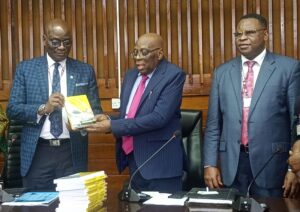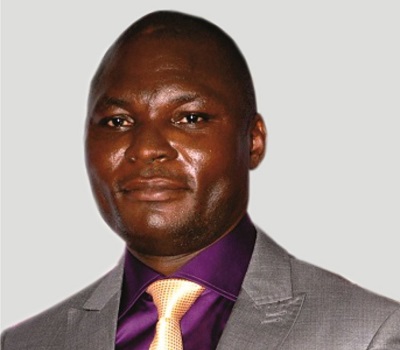PCC Urges UNILAG To Address Human Capital Gaps In Maritime Sector
-

L-R: Vice Chancellor of the University of Lagos (UNILAG), Prof. Oluwatoyin Ogundipe receives a book from the Chairman of Nigerian Ports Consultative Council (PCC), Otunba Kunle Folarin while the Deputy Vice Chancellor, Management Services, UNILAG, Prof. Lucian Chukwu watches; when the PCC presented some books to the UNILAG management at the institution’s Senate building, yesterday. UNILAG should exploit economic potentials of Lagos
By Kenneth Jukpor
The Chairman of Nigerian Ports Consultative Council (PCC), Otunba Kunle Folarin has tasked the University of Lagos (UNILAG) to develop learning structures to address the gaps that see most maritime sector operators go abroad for trainings.
Otunba Folarin made this appeal yesterday when PCC presented some books to UNILAG, stressing that the university should be able to take advantage of the huge economy of Lagos State, especially from the maritime sector.
“We need Marine Engineers, but most of them are being trained outside the country because we don’t have such institutions in the country. The same problem is seen with seafarers because we train them, but we don’t have the ships to give them practice experience (seatime) and without this, they can’t practice because they can’t get the certificate of competence (CoC).”
“There must be a linkage and collaboration between the universities and the establishments in the maritime sector. In the last six years, Nigeria has spent about N30billion in training and looking for seatime onboard foreign vessels,” the PCC boss said.
Otunba Folarin also called on the university management to embrace the opportunity in the maritime sector and seek to enhance its growth and development through a formidable partnership.
The PCC boss pointed out that as a coastal state, Lagos State contributes about 60-70% of the economy of West Africa, however, he bemoaned that there is still a dearth of qualified personnel in several areas of the sector, highlighting areas such as; Legal, Multimodal Transport, Shipping, Port Management.
He argued that the University of Lagos, as the academic and intellectual conscience of the nation, has not done enough to enhance seatrade which can contribute immensely in these areas of concern even as he noted that the institution is yet to leverage on the economic bouyancy of the state which accounts for most of the nation’s seaport activities.
On his part, the Vice Chancellor, UNILAG, Professor Oluwatoyin T. Ogundipe thanked the PCC delegation and acknowledged the need for the university to contribute its quota to building the nation’s maritime economy.
According to him, universities around the world aren’t really sustained by school fees, but via contributions of friends and alumni.
Prof. Ogundipe highlighted the several partnerships that the university have been involved in, most notably, the collaboration with the National Information Technology Development Agency (NITDA) in setting up an Information Technology (IT) hub at the Akoka campus of the university to nurture pool of both native and evolving talent and footloose IT professionals.
While thanking Otunba Folarin and his team for their willingness to partner the university in order to fully optimise the industry capacity, through well-synchronised policies and well outlined maritime programmes; the UNILAG Vice Chancellor noted that efforts by the institution to get Nigerian Ports Authority (NPA) involved in such arrangement had been futile.
Prof. Ogundipe observed that the management and employees of NPA and some other agencies have been more inclined to pursue foreign training possibly for estacode, rather than look inwards.
Beside the presentation of the book written by Dr. Edmund Chilaka, titled “The Rise, Fall and Liquidation of Africa’s Pioneer Carriers” – Nigeria National Shipping Line and Black Star Line, Otunba Folarin also presented a paper he delivered at a Maritime forum in the university in 2018







